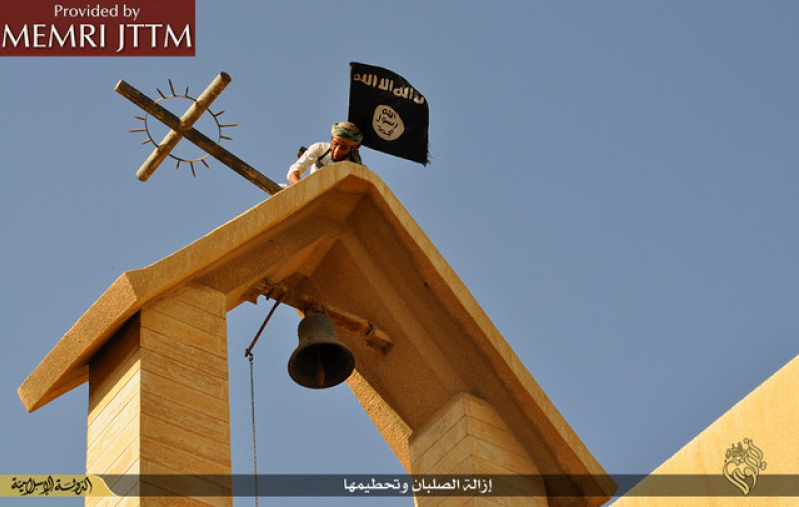
ISIS is converting the Syrian Orthodox Church of St. Ephraim into a mosque for Jihadist fighters. The terror group announced the historic church's conversion into a mosque through notices posted in the city streets.
The church will be used as a mosque for the Mujahideen and supporters of the ultra-conservative Muslim terror group. According to local reports, the church is now draped in the usual black and white logo bearing the statement "There is no God but Allah," Newsweek reports.
The announcement came a year after ISIS seized Iraq's second largest city and told Christian residents to convert to Islam, pay the jizya or tax imposed on non-Muslims, or be killed, sending an exodus of Christians fleeing to the safety of nearby towns.
Last year, rumors about ISIS' intention to use the church for their purposes circulated when photos showing the cross being taken down and the furniture in the church being sold outside the building surfaced on social media. The group has also taken the buildings near the church and used them as headquarters for their state council.
A Demand for Action founder and president Nuri Kino said that ISIS' attacks on structures and symbols associated with Christianity indicates that they are bent on "cleansing" their caliphate.
"If so, it's a scary development," said Kino. "If they changed a church to a mosque it is further proof of their cleansing, something that many call a genocide."
A recent report from BBC says that ISIS has confiscated Christian homes and marked them with "N," which stands for "Nasrani," a term the group uses to refer to Christians.
When ISIS began to seize Mosul last year, there were only around 3,000 Christians left in the city. As the terror group continued to advance into the city, which used to be the hotbed of Christianity in Iraq, they attacked Christian establishments and churches, killing an unknown number of Christian believers. Mosul is now believed to be devoid of Christians, according to Newsweek.
Mosul used to be home to Assyrian Christians - mostly mostly from the Catholic Church, the Syriac Orthodox Church and the Syriac Catholic Church - and Arab Christians represented by the Roman Catholic Church, Greek Orthodox Church, the Chaldean Catholic Church and the Syriac Orthodox Church. There were also several Protestant churches in the city.
Now ISIS has taken over and have the rid the land of Christian believers.
"They ... try to erase us in any way they can," said Kino.
"They take everything from us, but they cannot take the God from our hearts. They cannot," said the archbishop of the Syriac Orthodox Church in Mosul, Nicodemus Sharaf, in an interview with 60 minutes in March. He left the city last year and is now staying as a refugee in Erbil.







